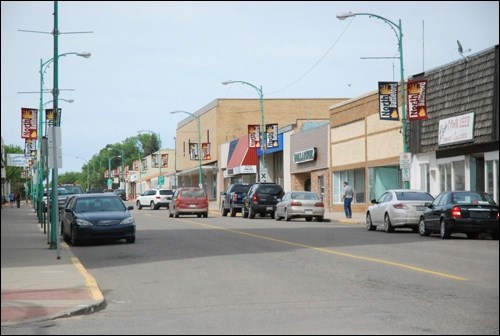The contentious process to approve a new official community plan and zoning bylaw for North Battleford has moved past second reading.
Council voted 4-1 in favour of second reading for the OCP and zoning bylaw Monday, but not before some amendments were passed to expand the allowable office sizes and allow discretionary use for theatres in more areas of the city.
The next step in the process is for notice to go out to the public.
That notice period lasts for 30 days. After that, the process calls for council to debate the OCP and zoning bylaw in a committee of the whole of council before it returns to council for third reading and final passage. Mayor Ian Hamilton indicated following Monday night's meeting that is not likely to happen until August at the earliest.
The process has proved to be a heated one with businesses located outside the downtown core expressing concerns about provisions restricting financial institutions, theatres and office buildings to the downtown area.
Concerns about the restrictiveness of the zoning provisions were previously expressed by the Battlefords Chamber of Commerce as well as by Terracap, the owners of Frontier Mall.
Also received at the meeting was a written submission from Battlefords and District Co-op, owners of Territorial Place Mall, outlining similar concerns. Mennonite Community Closet Inc. also repeated their desire to expand their downtown location in correspondence to the City.
The main discussion Monday revolved around several amendments introduced to alleviate some of the concerns raised by businesses.
One of those recommended by administration was to amend the future land use map and zoning district map respecting Home Building Centre, Sharron Children's School and the Killdeer Park subdivision to reflect current land uses. That passed unanimously.
As was widely expected prior to the meeting, another amendment proposed was a change in the wording to expand the allowable office size from an originally proposed 240 metres square to under 334 metres square.
That change was introduced by Councillor Greg Lightfoot and was to appease concerns raised by businesses on that issue. That amendment passed unanimously 5-0.
But that was not the end of the amendments. Councillor Ryan Bater came forward with three amendment proposals in response to "consultation with constituents, those who have submitted recommendations from the business community including the organized voice of the business community."
His first proposed amendment was to expand the number of areas where movie theatres could be a permitted use, to include the C-3, C-3A and C-4 in addition to the downtown C-1 zone. Those areas included the southeast quadrant and north end locations.
Councillor Kelli Saemann voiced support for Bater's proposed amendment, citing the city's own investment in recreation facilities in the southeast quadrant.
However, the proposal ran counter to sentiments of others on council who supported the idea that a new movie theatre ought to be located in the downtown core.
Councillor Cathy Richardson made clear she preferred to see those zones outside the downtown classified as "discretionary use" for theatres, to allow city council the power to be able to approve a development in that area.
The idea, Richardson said, was to allow council to "have the discussion about it" with any developer about possibly locating a theatre downtown.
Mayor Ian Hamilton, however, remained staunchly in favour of wording that would locate movie theatres downtown, saying downtown would be "significantly enhanced by a development like this."
Councillor Greg Lightfoot expressed similar sentiments and also pointed out another complication - the fact that the existing operator of the downtown Capitol Theatre holds the first-run movie rights in the entire city.
If that operator did not want to "build or expand or develop a new theatre, and just keep doing what they're doing, that's their right and we don't have anything to do with it. There's nothing we can do about it as a council or as a business community so I guess we have to keep that in mind."
Seeing there was not enough support for his proposal to make movie theatres a "permitted use," Bater offered to compromise and made the motion for movie theatres as a "discretionary use" in C-3, C-3A and C-4. With Bater, Saemann and Richardson voting in favour, that carried by a 3-2 vote.
Bater then made the same proposal for major office buildings in C-3, C-3A and C-4.
Again, Cathy Richardson made clear her preference that the classification be "discretionary use."
But Lightfoot opposed the amendment, citing the need to protect the downtown. And this time, Saemann also made known her preference for office buildings in the downtown core.
Along with Hamilton, those three votes were enough to completely defeat Bater's amendment.
A third proposed amendment by Bater was to allow financial institutions to locate in the C-3, the C-3A and C-4 as permitted uses, in addition to C-1. But that idea was a complete non-starter and did not gain a seconder, and did not get to a vote.
In the end only one of Bater's amendments - and a watered-down one at that - passed. When the votes for first and second reading of the OCP and zoning bylaw took place, Bater made known his dissatisfaction with the turn of events by casting the lone "no" votes. The other four councillors voted in favour, and the two readings passed by a 4-1 margin. (Councillors Ray Fox and Don Buglas were not present at Monday's meeting.)
Still, the process is far from over as third reading is still required for the OCP and zoning bylaw to be approved.
That means more communication between the various parties and legal counsel is likely over the coming weeks, which could result in further OCP and zoning bylaw revisions before it is signed and sealed.
The likelihood is that a public hearing and a final third-reading vote will take place in August.




